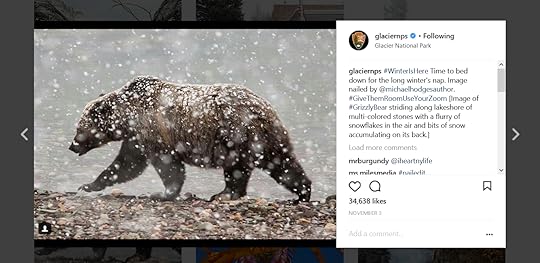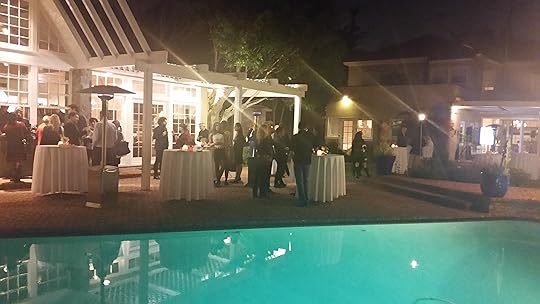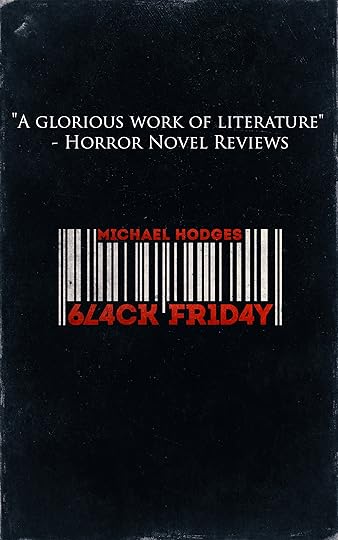Michael Hodges's Blog, page 9
January 28, 2018
The other places
I moved to Montana three years ago, because I liked the shoulder room. The state is full of big scenery, especially in places like Glacier National Park and Yellowstone. I enjoy the slower paced nature of the towns, the friendly people, and the balanced array of flora and fauna. It has a centering effect on me, and I felt it the first time I crossed the state line in 2001.
But strangely, it’s the smaller places that I chase in my photography and writing-the places avoided by tourists. These are overlooked and passed on the highway on the way to Glacier, on the way to Flathead Lake. Even now, sitting in my house and hunkered down for the winter working on a screenplay and new novel, they call to me. And sometimes, knowing they’re out there waiting, is enough.
The Rocky Mountain Front, Montana.
A post shared by Michael Hodges (@michaelhodgesauthor) on Jan 27, 2018 at 12:23am PST
January 18, 2018
My Instagram
Hey everyone,
In the last few months, I’ve been more active on my Instagram account. I’ve also been lucky to be featured on the official Glacier National Park Instagram account (my favorite park).
I share nature images, along with news about my writing. I’d love to see you all there.
Best,
– Michael
January 12, 2018
A reader question about THE PULLER
Yesterday I received a nice email from a reader named Colby. He talked about the detailed flora and fauna in THE PULLER, and how I’d been able to do so much research, and how he felt like he was there.
THE PULLER started as a short story, a long time ago. It was actually my first acceptance for any writing, ever. I was 24, and had been accepted into a Northwoods ghost anthology. Unfortunately, before the anthology could be published, the publisher was bought-out by a toy company.
Kind of a bummer.
At the time, this curbed my drive to be a writer, and I went on to do other things for a few years. But after some positive feedback in the non-fiction arena, I decided to brush off THE PULLER and turn it into a novel. I had a couple things going for me. First, I had years of experience hiking around the Upper Peninsula of Michigan. Along with that, I had an unbridled passion to tell this story. I had no doubts as to the location, character, and the concept. So I plunged into it. While much of my personal experience with the ecosystem was conveyed in the first draft, I had print outs of the flora and fauna of the U.P. at my side during the second revision. Beyond that, the manuscript received at least eight line edits. I cut 20,000 words before the book was accepted for publication.
At the time of acceptance, I’d been writing a lot of science fiction short stories, and had, in a way, veered away from THE PULLER’s style. This was a mistake, because the novel had heart. And in the end, readers pick up on that. They can feel the difference between being sincere, and a writer who’s just trying to impress other writers, like some out-of-touch 1980’s guitar wizard where the solo doesn’t fit the song.
And trust me, it’s all about the song.
There’s an old writing cliche called “write what you know”. This does apply, but I think it applies earlier on, rather than later on. Early, write what you know and are passionate about. The goal is to finish your work and find your voice. There’s no such thing as a novelist who didn’t finish a manuscript.
I knew a hell of a lot about the U.P. And so I poured that into my book, and worked hard to create what is known as “character as landscape” (or at least I hope I did).
The struggling moose herd is a real thing. The Huron Mountains are a real thing. Twenty Mile Bog is real, and so is the Black River. And in a way, the novel is a love letter to the U.P., the culture and the battered ecosystem.
I haven’t been back to the U.P. since 2009, and to the shack area since at least 1998. But it remains in my heart. And in a way, THE PULLER is me saying goodbye to my childhood.
A post shared by Michael Hodges (@michaelhodgesauthor) on Dec 19, 2017 at 4:22pm PST
January 7, 2018
Sunset elk in Glacier National Park
I came across this bull elk on the east side of Glacier National Park. Luckily, the elk had lined himself up perfectly behind a blazing sunset.
Bull elk at sunset, Glacier National Park. The big park never disappoints. I'm always in awe.
A post shared by Michael Hodges (@michaelhodgesauthor) on Jan 5, 2018 at 6:57pm PST
January 4, 2018
Perfecting your query letter and pitches
Agents see thousands of submissions a year. You have to craft a query that stands out above the rest.
Query writing is a different skill than novel writing, but it will be extremely helpful for your career. As novelists, we’re super attached to our novel, and try to cram everything into a pitch or query. It’s difficult to see our work objectively.
This is bad.
The goal is to elecit an emotional response in an agent with 200 words or less. And you want the query to be tight. It doesn’t have to be a mini-outline of the novel. It can be the inciting incident, or a catchy summary of the concept.
In the past, I’ve spent as much time working on query letters and pitches as I do my novels. Queries and pitches are the window to your writing. They represent you. And once you master the skill, it can be incredibly helpful in attracting Hollywood producers as well, where the “logline” is king. In 2017 I had numerous studios and producers reach out to me because of loglines/pitches. Now, that doesn’t mean you’ll convert those opportunities (I’m still waiting on some), but a good pitch will help create them. And as anyone knows, this business is about converting that rare and incredible opportunity.
I highly recommend Query Shark for taking off the whiskey goggles and seeing your query at its essence.
All of this is hard work. No one ever said it would be easy, or that you’re guaranteed anything. But when you have this skill in your pocket, it might just get a little easier.
You never know where a good pitch will take you. Image is from a book to film party at Résidence de France, Beverly Hills.
January 3, 2018
Award eligible work for 2017-2018
Hey everyone,
Politically, 2017 stunk. But it’s been good for my writing. My novel “Black Friday” is on the Stoker Award Reading List, and the Nebula Reading List for work published in 2017. Because of that, I’m offering free copies for any HWA (Horror Writers Association) or SFWA (Science Fiction and Fantasy Writers of America) member.
In addition, My short story collection “The Gloaming” is on the Stoker list, along with my experimental short horror story “Tree Line”(contained in the “The Gloaming”). I’m making these available for free to any interested HWA members.
“Black Friday” is diverse fiction featuring a black protagonist and strong female characters. The novel is a thriller at heart, but tackles race relations, consumerism, capitalism, and technology. It’s definitely raw and unfiltered work.
Best,
-Michael
December 31, 2017
Happy New Year!
I’d like to take this moment to wish everyone a happy and healthy new year. 2017 was a hell of a grind for nearly everyone I know. Yet, most of us made it through.
On the writing front, 2017 was outstanding. “Black Friday” has been incredibly well received by both the science fiction and horror communities, and my first short fiction collection, “The Gloaming” was released. I also had my first audiobook released by Tantor Media (“The Invasive“), and it’s available worldwide.
My debut novel “The Puller” came out in mid-2015, so I’m surprised and happy at how things are moving so quickly. Not to mention I’ve been contacted by at least a dozen producers the last year on various projects. It’s been exciting but also a little nerve-racking. It’s a crazy business, so I’m only going to focus on what I can control-and that’s the writing. For 2018, my writing goal will be aimed at producing two new high concept novels, which I’m really excited about.
In other parts of my life, I couldn’t be happier. I’m still living in my dream place, the great state of Montana. And my girlfriend Rachel recently moved in.
In a way, Montana tends to isolate you from the rest of the country. That has its good and bad points. But it’s been fantastic for my photography and well-being overall.
Wishing you and yours the best possible 2018.
– Michael
A post shared by Michael Hodges (@michaelhodgesauthor) on Dec 27, 2017 at 11:17pm PST
December 28, 2017
Tree Line and the Bram Stoker Award Recommendation List
Hey everyone,
This year I released my first short fiction collection, “The Gloaming”, which made it onto the Stoker Award Reading List along with my novel “Black Friday” and my short story “Tree Line”. Because of that I’ve decided to make “Tree Line” available to read here, for free to HWA members, or anyone else who enjoys short, experimental fiction.
Tree Line
I.
11 p.m. says the watch of my dead son.
II.
The darker it grows, the closer the forest things creep.
III.
But I have light. A single, crusty bulb hanging from the ceiling of this logging shack. It is the only thing keeping them at bay. The bulb is powered by a windmill generator in an orchard, ten acres carved from a million of dusky boreal forest. Julip Camp is hike-in only. The waist-high orchard grass that surrounds it kneels in the breeze. When there is a breeze. And light.
Company men to our core, Frank Ficher, Douglas “Saw Hands” Merc, Reynold “Spike” Higgins and I dug hard into the remotest corners of forest, cutting 7,000 board feet of lumber. As the last spruce was felled, we’d all heard something shrieking in a deep, firefly-lit glade. I’ve been the leader of Backwoods Unit 12 for a decade, gaining the respect of upper management with my penchant for minimal injury and maximal board feet. But in all my remote operations, I’d never heard such a sound. I’ve never believed in spooks, either. My wife Isabella used to call me a corned beef hash kind of guy. I think it was a compliment. The men and I had chuckled about the shrieking at first, then hustled back to camp in the dimming light. Although the men grinned as we worked through the ferns, I had a knot in my stomach, the same one I had when my boy died last year. Echo had been helping Isabella collect fresh green peppers and celery from our garden when wind toppled an old growth hemlock across his back. My fifteen year old boy’s spine might as well have been our marriage, too.
V.
The timber lay felled in the forest, crisscrossing in the fading light like femurs and tibias, waiting for the company to haul them away.
VI.
Frank, Douglas, and Reynold disappeared at dusk, along with the last of our flashlights. They were out night hunting for venison along the softwood-lined edges of Flathead Bog. I’d heard their fading screams from atop the orchard. Then I’d seen peculiar colors in the darkening sky, curling like fine mist above the bog’s spruce and fir crowns.
VII.
Midnight. The bulb filament fades. The wind blows against the hand-chinked logs. The bulb shines. I can hear the wooden windmill creaking out there like some old scarecrow. I close my eyes and picture the view from the orchard, the green expanse of Michigan’s Northwoods, rising to Mt. Curwood. There are three windows in the shack, one for the north, south, and east walls. Each is covered with a ratty burlap curtain. A slate fireplace bulges to the pitched ceiling in various shades of grey and black. Whiskey bottles, shot glasses and packs of Marlboro Reds rest on the jutting slate ledges. Stacks of National Geographic and Playboy had lined the shelves, but
I’d burned everything I could find that wasn’t outside in the fireplace in order to keep light. That didn’t last long. All that remains on the shelves are strike-tip matches, various coins, and pocket knives. A triple bunkbed takes up half the east wall, while a cast-iron stove sits in the far corner. I made sure to close both flues.
VIII.
I peel back the east window’s burlap curtain and peer into the night. On the orchard high ground, the windmill’s blades spin and slow, matching the bulb’s intensity. Then, at once, the windmill stops. The shack darkens as I gaze into the orchard, past thick aspen and the outhouse with the moon and stars carved into the top. Something curls above the orchard grass towards me, like expelled octopus ink. I shut the curtain and jerk back, just in time to hear the glass crack. I whip my head towards the northern window as it too cracks. Then the south. I drag my metal chair to
the shack’s center, then retrieve my shotgun from the card table and lay it across my lap. I pray Isabella finds happiness again. And then I pray for Echo, and that someday again I may see his gentle eyes and the fluid style of his axe work. There’s a pounding at the iron-bolted door, a scraping along the logs, first the east wall, then the west. I raise the shotgun off my lap as the east window explodes, splaying the burlap and shooting glass across the shack. I cover my eyes and collapse to the floor. When I look up, the curling ink oozes in through the east window, like
a long, slow tentacle. Others of the kind follow, and form a chain in the log ceiling beams. The ink coagulates and stipples into recognizable patterns, and soon these patterns form faces. Crow’s heads with human eyes and noses. Human faces with lamprey mouths and ungulate eyes. A face that looks as if it’s drowning at the base of a cold falls, right cheek concave from water pressure. A human face with wolf ears and walleye teeth, grinding its jaw, screaming, and grinding its jaw. The apparitions float closer, their eyes widening. I fire my shotgun. The pellets
reveal bright, raw wood in the ceiling logs and make me temporarily deaf, but do little else. The faces shriek and bulge their eyes in anticipation. Wind caresses the logs and orchard grass, and then I hear the windmill creak. The filament glows. A cone of orange light bathes me and glints the whiskey bottles. The night things slither out the east window and wail across the orchard towards tree line.
IX.
After boarding up the windows with sheet metal I’d found behind the cast-iron stove, I arrange my chair in the center of the shack, directly below the inconsistent bulb. My neck muscles hurt from looking up so much, and I see vision spots from staring into the light. The orchard grass sings, the aspen leaves a hundred balsa chimes. The air smells of cedar logs, sweet grass, and bog musk. I sigh and remove a pocket watch from my Carharts. I brush dust from the silver lid and wedge it open with my dirty thumbnail. It’s a unique piece, half-compass, half-watch with Charlemagne font and a painting of an otter in the middle. Otters were my boy’s favorite animal. I’d given him the watch for his fifteenth birthday, two months before he was killed. I even had it engraved.
I grip the watch in my trembling fingers, and keep my other fingers wrapped tight around the shotgun stock. On my lap rests a case of strike-tip matches. I think about Isabella, about the cold that had wedged between us the last year. And how I don’t feel the coldness tonight, despite the things hidden amongst tree line. I just want to be near her, to tell her it wasn’t her fault, to brush her hair from her pretty hazel eyes and tell her it’ll be alright, that Echo is in a good place.
X.
Wind.
XI.
Two a.m. says the watch of my dead son.
XII.
The filament glows, then dims. The orchard grass stops sighing. I can no longer hear the windmill. But I hear them. They pound and scrape against the log walls and crack the remaining windows. Soon they burst through and pummel the sheet metal. I brace in my chair, watch in my left hand, shotgun in the other. The first one slithers between the sheet metal and window frame, brushing past the ratty burlap curtains and expanding up into the ceiling beams. The others follow, then stipple themselves into obscene faces. I turn away, then set my watch and shotgun
down. I strike a match. I know it’s lit because I can feel the heat on my thumb and forefinger. I keep my eyes closed tight as the things wail inches from my face. I try not to picture their eyes. I try not to picture anything except my dear wife and I holding hands as we picnic alongside Silver Creek with Echo. The heat fades from my fingertips and I try to strike another match. Something bites my neck and I scream. A thing tears into my ankle, then my inner thigh. I scream and recoil, but am able to strike another match. The biting stops and the wails resume. I hold the match near my face, feeling the heat in my cheeks. I keep my eyes shut tight.
XIII.
The match dies. They are on me at once, biting and scratching. I reach for the matches but they have me pinned. Out in the orchard the windmill revolves, a hopeless thing in all this pain. I scream and flail for the strike-tips. The windmill rattles. I look up between snaking apparitions and watch the filament burn orange. In an eye blink they vanish out the southern window, wailing and undulating back to tree line. My skin is glassy with blood and my tendons ache as I unfold my tattered body along the floor. The raw scent of exposed flesh fills my nostrils. I listen beyond my thrumming heart for the orchard grass, or the aspen. But there is no wind. At all.
XIV.
The bulb dims and brightens, dims and brightens, and for a moment I think I see the drunken grins of Frank, Douglas and Merc, framed by the cabin logs. I slide open the strike-tip match case and count the crisscrossing sticks, then look for my son’s pocket watch. I cannot find it.
XV.
I wait beneath the flickering bulb, bloody and sweaty. The light holds place for dawn, and when I see the first rays illuminating the sheet metal edges, the windless windmill ceases. I stand from my chair and wince as something knocks weakly against the door. I press my ear to the battered oak and hear a chain clatter to the slate steps outside. I unlatch the heavy iron bolt and allow the door to creak open. There, on a hunk of slate is my son’s silver pocket watch. It’s warm to the touch as I grasp it in my blood crust fingers. I thumb the lid open and read the words I’d had engraved years ago: Even the finest woodsman sometimes needs help finding his way home.
December 12, 2017
The 2017 Nebula Award Reading Suggestion List
My dark thriller “Black Friday” is on the 2017 Nebula Award Reading Suggestion List. And since it is, I’m offering free review copies in .pdf, .mobi, and .doc to members of the Science Fiction and Fantasy Writers of America. Hit me up at writer@michaelhodgesfiction.com and I’d be happy to send one your way.
Black Friday is a dark science fiction thriller, as well as diverse fiction that explores capitalism, materialism, and race relations.
A summary/review, below.
Black Friday is a glorious work of literature. The characters live and love and breathe and think and speak. They are visceral entities with powerful backstories and fallible moral compasses. Hodges’ characterization takes these human beings by the hand and forces them to evolve into spectacular shadows of their former selves. He uses exquisite prose to carve out detailed thoughts and emotions.
December 3, 2017
HWA Bram Stoker Award Recommendations
Three of my stories are on the 2017 Bram Stoker Award Recommendation List: “Black Friday” in the novel category, “Tree Line” in the short fiction category, and “The Gloaming” in the fiction collection category. Weird to be on that with Stephen King and David Lynch, to say the least.
I’m offering review copies of all three stories to any interested members of the Horror Writers Association.
I’ll also have some other cool, top secret writing news coming up.
Best,
– Michael






